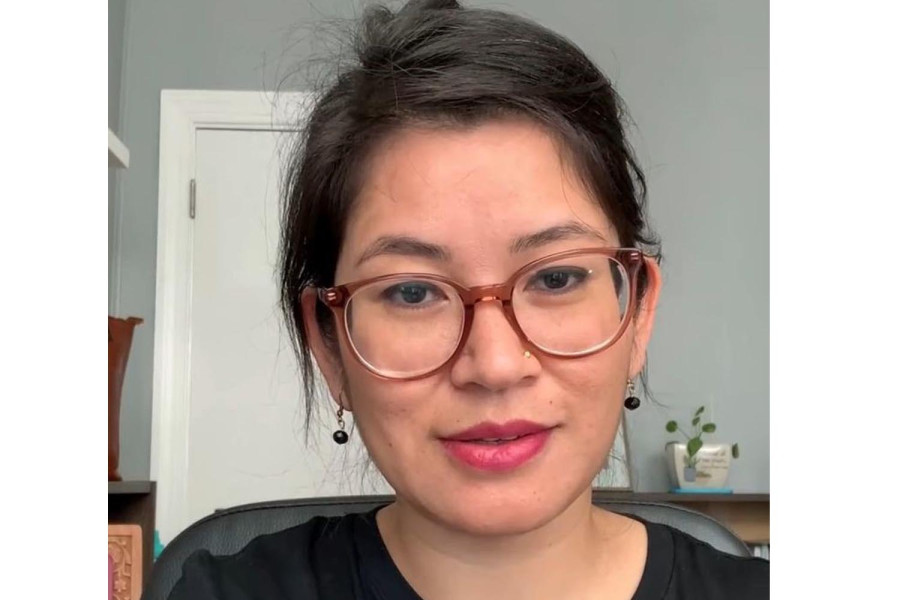Books
Challenging gender norms through literature
Weena Pun discusses her debut novel, ‘Kanchhi’, inspired by the struggles of women in Nepal and the socio-political landscape that shapes their lives.
Rishika Dhakal
Weena Pun is the author of ‘Kanchhi’ (2024), now available in bookstores across Nepal. She graduated from Stanford University and the MFA Program in Creative Writing at Cornell University. Pun currently lives in Maryland, the US. In this conversation with the Post’s Rishika Dhakal, Pun discusses her debut novel, inspired by the struggles of women in Nepal and the socio-political landscape that shapes their lives.
What is your novel Kanchhi about?
In a nutshell, Kanchhi is about a girl who goes missing and her mother who awaits her return. But it’s also about the hamlet Kanchhi is from, its people, its culture and the socio-political reasons Kanchhi disappears. Quiet in the background is the story of Nepal itself, just as ambitious as Kanchhi, longing for something bigger than the state it is in.
How did you develop the characters in your novel? Are they purely fictional?
Meticulously. I developed the characters by drafting scenes after scenes, by having the characters interact with each other, by researching them or their like in the real world, by digging deep into my own memory bank—basically, by just writing. What I just did here is describe the writing process. That’s the only way, I think. You just have to sit down and write and get a feel for the characters as you continue to suss out the story.
The characters are purely fictional and not. I mean you are not going to find the characters as they are in the book in real life, but then there are also a lot of people who are very much like the characters in the novel. I think that happens because the process of creating a character involves memory, imagination and research, including observation. Even if you are molding the character after someone you know or an approximation of someone you know, the very act of imagining that character and then describing them and what they do in such a way that fits the story and pushes it forward make them fictional. It's not easy.
In Kanchhi, you explore themes of rebellion, family and social expectations. What inspired you to focus on these particular themes and how do they resonate with modern day issues in Nepal?
To be honest, I did not really focus on these themes. I think they just made themselves known because I am a woman from Nepal writing about women in Nepal—rebelling against family and societal pressures just comes with the territory for us. I think these themes will definitely resonate with modern day issues in Nepal because we are not that far from the turn of the millennium, the period in which my novel takes place. Unfortunately, women in Nepal today are dogged by the same issues that my characters grappled with in the 80s, 90s, and 00s. From being told to act like a girl to not laugh like a girl to policing sexuality to discriminatory citizenship clauses in the constitution—things haven’t really changed, have they?
How has your journalistic background influenced your fiction writing, especially in creating a narrative that is both engaging and clear?
I’m not sure. I was a fiction writer long before I was a reporter, even though my fiction publication record was non-existent at the time I joined the Post in 2013. I had, however, already begun work on the novel, and from my times writing sporadically on it, I knew I had a lot of work to do. For one, I needed to know Nepal better, and two, I needed to sharpen my interviewing skills so that I could know Nepal better. I was very shy then and scared of approaching people with questions. Reporting took those worries away and taught me that no question was stupid if you were searching for the truth. This is to say that yes, journalism must have definitely helped me with my fiction writing. I’m just not sure if it made my writing more engaging or clearer. What it definitely did was help me be able to talk to people and find things out and help me get a good overview of the larger, socio-political issues at play in the country—issues that one way or another affected my characters in rural Nepal.
Gender dynamics are a significant part of Kanchhi. With the book shedding light on the societal pressures women face, what do you think is the role of literature in challenging or reflecting these gender norms in Nepali society?
The role of literature in reflecting gender norms in Nepali society is unavoidable, even when it’s a man writing a story that on the surface has nothing to do with gender dynamics. The inclusion, exclusion and the nature of inclusion and exclusion of women in literature say a lot about gender norms, roles and perceptions in the society that the work of literature is based in. Now, the writer might not set out to reflect these realities, but it just happens. When you write about the society you know, you end up showing it a mirror. Whether the work of literature might end up challenging the prevalent gender norms, though, depends upon the writer and the nature of work itself because challenging something requires deliberation, requires effort, and not every writer is up for that. But then, maybe if you are not up for that, you are not producing a genuine work of literature? But then what is a genuine work of literature? I don’t know. I’ll have to think harder on this.
In recent years, there has been a growing interest in global literature from Nepal. What do you think is driving this increasing attention to Nepali stories and what role does Kanchhi play in this trend?
My reading on this is that the writers who were born in the 80s and grew up in the 90s during that wave of economic liberalization, globalization and the start of the multi-party democracy in Nepal have now come of age. These writers grew up learning English in ‘boarding’ schools, grew up reading global literature written in or translated into English, and grew up practicing their constitutionally protected right to freedom of speech. Meaning, we are now more than ready to engage with global literature, talk to it or at it, and tell our own stories. I think the interest is only going to grow, as more Nepalis become fluent in the language of global literature.
As for where Kanchhi fits in all this—I think it fits squarely in there. Kanchhi is an attempt to tell a story of a girl in rural Nepal in English by a woman from Nepal who grew up reading world literature in the 90s and the early 2000s and who always wanted to see her own stories reflected in it. I, and by extension Kanchhi, are a product of our times.
What do you hope readers will remember about Kanchhi?
For some reason, this is a really hard question. Let me try answering this by telling you an anecdote about how I had felt when I first read Arundhati Roy’s The God of Small Things. I read the book in 2005 when I was in my second year of A-levels. What wowed me the most about the book was the fact that it was about a South Asian country written by a South Asian writer, written in English and written very well. Something I had not realized was possible or had forgotten that it was possible since we did read R. K. Narayan in English classes. So, my point is, I remember that feeling of wonder when I first read The God of Small Things, and while I am no Arundhati Roy and Kanchhi is not The God of Small Things, I still hope that my readers are able to find something in Kanchhi that they can cherish forever.
Weena Pun’s book recommendations
The Copenhagen Trilogy by Tove Ditlevson: An amazing series of memoirs that talks about the working-class life as it is. No exoticization, no romanticization, no beseeching for pity, no triumphalist narrative. Just a narration of life as it was.
The Things They Carried by Tim O’Brien: This is an exceptional account of the Vietnam War told like it was—a theme emerging here. I return to this book every once in a while, to remember what a fast-paced, honest fiction feels like.
This Boy’s Life by Tobias Wolff: Another memoir but reads like fiction. The details and the pacing here are just absolutely amazing. Makes me want to write about my life like that.
How to Love Your Daughter by Hila Blum: Plotwise, nothing happens, but the writing (even in translation, which is what I read) is exquisite. The anguish of a mother who cannot bear that her daughter has chosen to be estranged from her is all over the book but is never maudlin. Wish I had come across this book while I was drafting Kanchhi—or maybe not.
Mothers and Others by Sarah Blaffer Hrdy: When I was a new mother (yup, motherhood is another theme here) and wracked with fear and anxiety, this anthropological work pulled me through. It let me know indirectly that my anxiety was normal and had an evolutionary basis and therefore benefits.
This online version of the interview has been edited for clarity




 8.71°C Kathmandu
8.71°C Kathmandu










